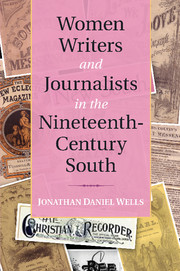Book contents
- Frontmatter
- Contents
- Acknowledgments
- Introduction
- Part One Foundations
- Part Two Women Journalists and Writers in The Old South
- Part Three Women Journalists and Writers in The New South
- 6 New South Periodicals and a New Literary Culture
- 7 Writing a New South for Women
- 8 Postwar Women and Professional Journalism
- Epilogue Women???s Press Associations and Professional Journalism
- Bibliography
- Index
- References
7 - Writing a New South for Women
Published online by Cambridge University Press: 25 October 2011
- Frontmatter
- Contents
- Acknowledgments
- Introduction
- Part One Foundations
- Part Two Women Journalists and Writers in The Old South
- Part Three Women Journalists and Writers in The New South
- 6 New South Periodicals and a New Literary Culture
- 7 Writing a New South for Women
- 8 Postwar Women and Professional Journalism
- Epilogue Women???s Press Associations and Professional Journalism
- Bibliography
- Index
- References
Summary
The devastation wrought by the Civil War left many southern women feeling that careers and occupations were no longer a luxury but an utter necessity. In an 1868 North Carolina magazine article titled “The Women of the South,” one commenter noted that “Fortunes have been swept away; we are nearly all poor. Many who were born and reared in affluence, now find it difficult to get bread, while those who were always poor are poorer still…. We can no longer live the life of ease to which we have been accustomed. We must work or perish.” Yet, beyond small-scale needlework or farming, opportunities for women remained circumscribed by traditional notions of gender roles. Women were becoming teachers in greater numbers, but the most alluring paths for many educated women were careers in writing and editing. As they had before the war, postbellum women entered the fields of literature and journalism with optimism. According to contemporary observers, such careers carried with them a new sense of urgency in the postwar miasma. “The pursuit of letters,” claimed the editor of a southern magazine in 1867, “is not now a recreation, but an earnest effort for a livelihood.” Women could be found as fiction writers, essayists, editors, translators, poets, and periodical contributors. By 1870, one Nashville editor could claim, “This is the era of woman’s reign in the republic of letters.”
- Type
- Chapter
- Information
- Women Writers and Journalists in the Nineteenth-Century South , pp. 142 - 166Publisher: Cambridge University PressPrint publication year: 2011
References
- 2
- Cited by



